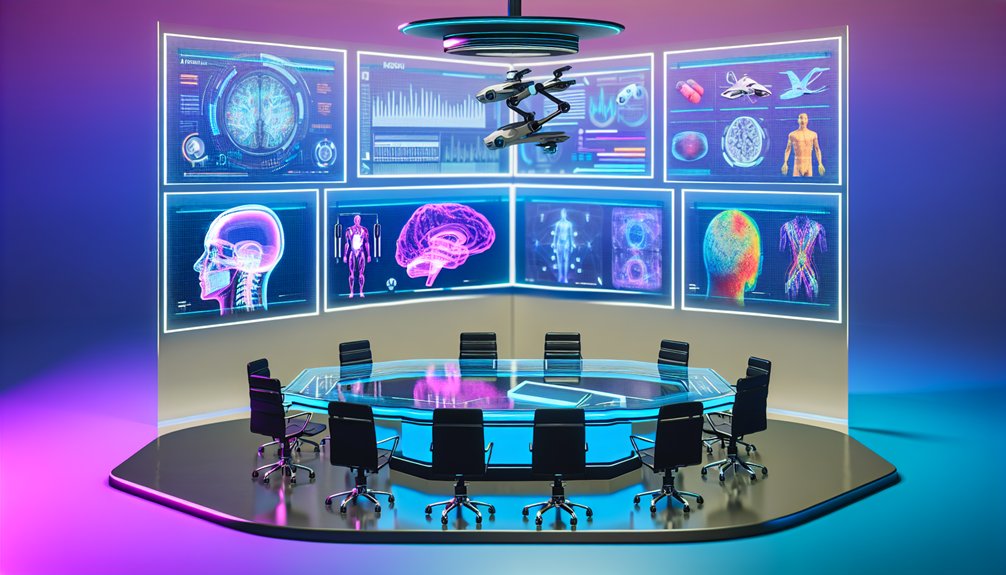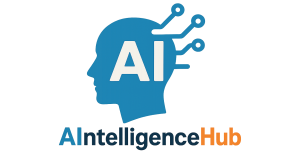
You’re experiencing a healthcare revolution with AI breakthroughs such as AI-driven drug discovery and personalized medicine, which speed up development and tailor treatments. Diagnostic tools powered by AI enhance imaging accuracy, while robotics-assisted surgery boosts precision. Predictive analytics improve patient outcomes and resource management. AI elevates medical imaging analysis and virtual health assistants enhance accessibility and patient engagement. These transformative innovations are just the beginning of AI’s potential to reshape healthcare.
AI-Driven Drug Discovery

Although the process of drug discovery has traditionally been slow and costly, AI-driven approaches are revolutionizing this field. By utilizing machine learning algorithms, you can now sift through vast datasets quickly, identifying potential drug candidates with unprecedented speed. These algorithms excel in compound screening, analyzing thousands of chemical compounds to predict their efficacy as therapeutic agents. This efficiency not only reduces the time required for discovery but also markedly cuts costs.
Personalized Medicine With AI
You’re witnessing a transformation in healthcare as AI enhances personalized medicine through genetic profiling advancements. These innovations allow you to benefit from tailored treatment plans that maximize efficacy and minimize side effects. Predictive health analytics further empower you to anticipate potential health issues, fostering a proactive approach to your well-being.
Genetic Profiling Advancements
As AI revolutionizes healthcare, genetic profiling stands at the forefront of personalized medicine, offering unprecedented insights into individual health. By analyzing your genetic risk, AI-driven tools can predict potential health issues before they manifest. This enables proactive measures tailored specifically to your genetic makeup. Furthermore, advancements in gene editing, powered by AI, provide the potential to correct genetic anomalies, paving the way for treatments previously deemed impossible.
AI algorithms rapidly process vast genetic data, identifying patterns and correlations that human analysis might miss. This enhanced understanding empowers you and your healthcare providers to make informed decisions about your well-being. Genetic profiling doesn’t just predict diseases; it reshapes how you approach health, focusing on prevention and precision. With AI, personalized medicine becomes not just a possibility, but a reality.
Tailored Treatment Plans
Imagine receiving a treatment plan specifically designed for your unique health profile. This is the promise of personalized medicine through AI, where algorithmic customization tailors healthcare solutions to fit you like a glove. By analyzing your medical history, genetic data, and lifestyle factors, AI systems craft strategies that enhance treatment effectiveness. But it doesn’t stop there. AI fosters patient engagement by involving you in decision-making processes, ensuring you understand and agree with every step of your care. This collaboration not only boosts adherence to treatment plans but also empowers you with knowledge about your health. In this way, AI doesn’t just offer solutions; it creates a partnership between technology and patient, making healthcare more personal and precise than ever before.
Predictive Health Analytics
While the complexities of the human body can seem overwhelming, predictive health analytics with AI is transforming how we anticipate and manage health issues. By leveraging AI, you can decode health trends from vast datasets, identifying patterns that might otherwise go unnoticed. This advanced data interpretation allows for more accurate predictions about potential health risks, enabling you to take proactive measures tailored to your individual needs.
AI systems analyze your medical history, lifestyle factors, and even genetic information to provide personalized health insights. This approach doesn’t just improve diagnosis and treatment plans; it also enhances preventive care. By understanding potential future health scenarios, you can make informed decisions about your well-being. Ultimately, predictive health analytics with AI offers a glimpse into a future where personalized medicine is a reality.
AI-Powered Diagnostic Tools
AI-powered diagnostic tools are revolutionizing healthcare by enhancing imaging accuracy, which allows you to detect diseases earlier and more reliably. This not only improves patient outcomes but also enables the development of personalized treatment plans tailored to individual needs. By integrating these advanced tools, you’ll find that healthcare becomes more efficient and precise.
Enhanced Imaging Accuracy
As technology advances, the integration of AI-powered diagnostic tools in healthcare is revolutionizing imaging accuracy. These tools enhance images by refining details that might be missed by the human eye. You’ll notice that AI algorithms can reduce noise, improve resolution, and highlight critical areas, leading to image enhancement that’s invaluable in clinical settings. This level of precision guarantees that healthcare professionals can make more informed decisions, ultimately increasing diagnostic precision.
When you rely on AI for imaging, you minimize the risk of human error and improve diagnostic outcomes. The ability of AI to analyze vast amounts of imaging data swiftly and accurately means quicker, more reliable results. Fundamentally, AI’s contribution to imaging accuracy is transforming the way medical professionals approach diagnostics.
Early Disease Detection
Imagine the possibilities when AI-powered diagnostic tools catch diseases at their earliest stages. These tools revolutionize healthcare by enhancing symptom analysis and risk assessment, enabling timely interventions.
- Symptom Analysis: AI sifts through vast data to identify subtle patterns, predicting conditions before symptoms appear.
- Risk Assessment: Algorithms evaluate patient history, lifestyle, and genetics to forecast disease probability.
- Efficiency: Quick, accurate diagnostics reduce reliance on invasive tests, saving time and resources.
- Accessibility: AI tools can reach underserved areas, providing crucial health insights where traditional methods fall short.
- Data Integration: Continuous learning from diverse datasets improves diagnostic precision over time.
Personalized Treatment Plans
While healthcare has traditionally relied on standardized treatment protocols, AI-driven diagnostic tools now offer the potential for personalized treatment plans like never before. You’re seeing a shift towards more individualized care, where AI analyzes your unique medical data to tailor treatments specifically for you. This enhances patient engagement, as you’re more likely to be invested in a plan that considers your specific circumstances. Additionally, AI aids in treatment optimization by predicting outcomes based on vast datasets, ensuring the most effective approach is chosen. For instance, it can suggest the best medication dosages or lifestyle adjustments by evaluating your genetic, lifestyle, and clinical data. This precise customization not only improves health outcomes but also minimizes unnecessary treatments, making healthcare more efficient and effective.
Robotics-Assisted Surgery

Robotics-assisted surgery is revolutionizing the healthcare landscape by enhancing precision and reducing recovery times. With robotic enhancements, you can achieve surgical precision, which minimizes complications and improves patient outcomes. These systems offer several benefits:
- Accuracy: Robots provide precise control, reducing human error.
- Minimal Invasiveness: Smaller incisions lead to less trauma and quicker recovery.
- Flexibility: Surgeons can perform complex procedures with improved maneuverability.
- Consistency: Robotic systems deliver uniform performance across procedures.
- Enhanced Visualization: High-definition cameras offer detailed views, aiding intricate surgeries.
AI in Medical Imaging Analysis
Advancements in AI have profoundly transformed medical imaging analysis, offering unprecedented accuracy and efficiency. With AI-driven tools, you’re now able to enhance image segmentation, enabling precise delineation of anatomical structures. This means radiologists can focus on critical areas, reducing interpretation time and improving diagnostic accuracy. Anomaly detection is another significant benefit. AI algorithms can identify subtle abnormalities, sometimes even those invisible to the human eye, ensuring early intervention and better patient outcomes.
AI for Predictive Healthcare Analytics
As AI continues to evolve, predictive healthcare analytics is revolutionizing how medical professionals forecast patient outcomes. You’ll find that predictive modeling and data integration are key to this transformation, enabling you to anticipate and mitigate potential health risks. Consider the following advancements:
- Risk Stratification: Identifying patients at risk for specific conditions before symptoms manifest.
- Resource Allocation: Efficiently distributing medical resources based on anticipated patient needs.
- Chronic Disease Management: Enhancing care plans through continuous data analysis.
- Emergency Room Optimization: Predicting patient volume to reduce wait times and improve care.
- Personalized Treatment Plans: Tailoring therapies based on individual risk profiles and historical data.
Virtual Health Assistants Powered by AI

Virtual health assistants, powered by AI, are transforming patient interaction and healthcare delivery. They’re revolutionizing virtual consultations by providing timely, accurate responses to patient queries, thereby enhancing patient engagement. You can rely on these assistants to manage appointments, answer questions, and even monitor health metrics.
| Feature | Benefit | Impact on Healthcare |
|---|---|---|
| Virtual Consultations | Quick, accessible medical advice | Increased patient satisfaction |
| Patient Engagement | Personalized interaction | Improved adherence to care |
| Health Monitoring | Continuous tracking of health metrics | Early detection of issues |
Their ability to offer personalized care improves adherence to treatment plans, ensuring better health outcomes. By facilitating continuous health monitoring, virtual assistants can detect issues early, allowing for timely intervention. They’re not just tools; they’re partners in your healthcare journey, making a significant impact every day.
Frequently Asked Questions
How Does AI Handle Patient Data Privacy Concerns?
Imagine AI as a vigilant guardian, safeguarding patient data like a dragon protecting its treasure. It employs data encryption, guaranteeing information stays locked away from prying eyes. With consent management, you’re always in the driver’s seat, deciding who accesses your data and when. By weaving these protective measures, AI addresses privacy concerns, balancing innovation with security. This harmonious blend guarantees your personal information remains as secure as a fortress.
What Are the Ethical Implications of AI in Healthcare?
When you consider the ethical implications of AI in healthcare, it’s vital to focus on AI accountability and bias mitigation. You must guarantee AI systems are transparent and held responsible for their decisions. Addressing bias is essential to provide fair treatment to all patients, regardless of demographic factors. It’s your role to push for ethical guidelines that prevent discrimination and guarantee AI enhances, rather than hinders, equitable patient care outcomes.
How Can AI Improve Healthcare Accessibility in Remote Areas?
AI can greatly enhance healthcare accessibility in remote areas by integrating telemedicine solutions and remote diagnostics. You can connect with healthcare professionals instantly, reducing the need for physical visits. AI-driven platforms analyze patient data to offer accurate diagnostics and personalized treatment plans. This empowers you to receive timely care, even in isolated locations, bridging the gap between urban and rural healthcare services and making quality healthcare more universally accessible.
What Are the Limitations of AI in Healthcare Applications?
When you consider AI’s limitations in healthcare, think about AI biases and algorithm transparency. AI can inherit biases from training data, leading to skewed outcomes. You’re also faced with opaque algorithms, making it tough to understand decision-making processes. This lack of transparency can erode trust and complicate accountability. While AI offers potential, addressing these issues is vital to guarantee fair, reliable, and ethical healthcare applications. Remember, understanding these challenges is key.
How Is AI Integrated Into Existing Healthcare Systems?
You’ve heard the saying, “Don’t put all your eggs in one basket.” When it comes to AI implementation strategies, integrating AI into healthcare requires balancing multiple approaches to optimize workflows. You need to guarantee AI tools fit seamlessly with existing systems, enhancing data analysis, patient management, and diagnostic accuracy. By aligning these technologies with everyday practices, you can elevate healthcare delivery, ensuring a more efficient and effective system overall.
Conclusion
In exploring AI’s recent breakthroughs in healthcare, you’ve witnessed a revolution akin to a skilled orchestra tuning its instruments to perfection. From drug discovery to virtual health assistants, each advancement harmonizes to enhance patient care and precision. As AI continues to evolve, it promises to transform healthcare into a more predictive, personalized, and efficient field. Embrace these innovations, and you’ll find yourself at the forefront of a healthcare symphony that’s more harmonious than ever.



